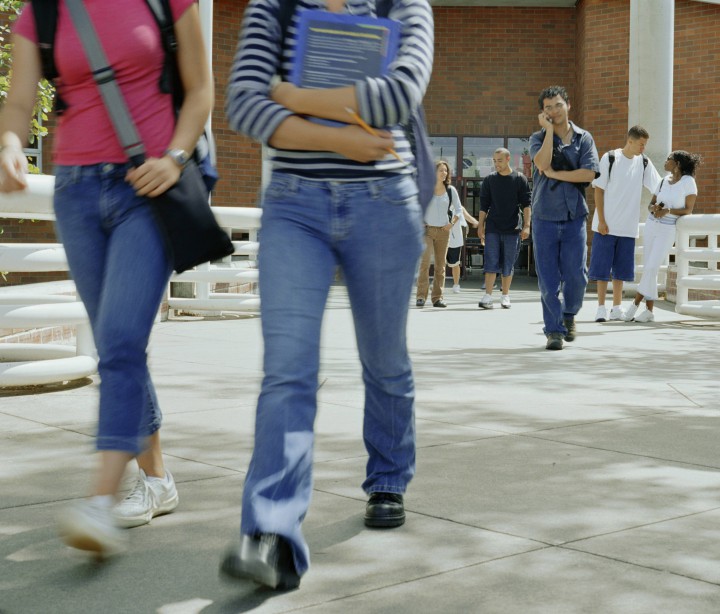TORONTO – Grades and bank account balances aren’t the only numbers freshmen students on campus worry about. Between the beer, pizza and energy drinks, first-year students’ waistlines and the infamous “Freshman 15” are what studies are made of.

Frosh 15 is allegedly when first-year university and college students put on a little weight – 15 pounds to be precise. But the jury is still out on whether the notion is myth or reality.
Canadian experts are quick to say that the “15” doesn’t hold any truth, but the frosh group does put on some extra padding. It’s just that the thinking on the range of weight gain varies.
“Some people go up and some people go down but, on average, it’s only a couple of pounds. The idea that everybody’s going to gain 15 pounds is really a bit of a myth and isn’t supported by literature,” Dr. Christopher Ardern said.
He’s a kinesiology and health sciences professor at York University.
Read more: Young Minds: Growing research backing nutrition’s role in mental health
Ardern points to a 2011 Ohio State University study that suggests the weight gain is closer to three pounds during the first year of college. Even then, that weight gain is only a half-pound more than their counterparts at the same age who didn’t go to post-secondary studies.
In that case, about 7,500 students were studied.
- Life in the forest: How Stanley Park’s longest resident survived a changing landscape
- ‘Love at first sight’: Snow leopard at Toronto Zoo pregnant for 1st time
- Buzz kill? Gen Z less interested in coffee than older Canadians, survey shows
- Carbon rebate labelling in bank deposits fuelling confusion, minister says
But a year later, another U.S. study out of Auburn University said that students, on average, gained closer to 12 pounds in a single year. That’s a dramatic difference in findings. At least 70 per cent of students gained weight.
Either way, Ardern says that it’s at this transition point in life that young adults’ lifestyle habits are put to the test.
“It’s a teachable moment, a critical transition from high school to university in terms of behaviours, opportunities and unique stressors that go on. There’s quite a bit of variability in response,” he said.
That reaction could determine how much or how little students gain in this pivotal time of their lives.
Read more: What Canadians want to know about what’s in fast food meals
Cleveland Clinic Canada registered dietician Jennifer Sygo says it’s the variety that throws students off, whether they’re living on campus or just starting to cook their own meals.
“There are a lot of landmines either way,” she said.
Research has shown that options – say, plenty of choice in a food court – can be one of the predictors of weight gain. Students aren’t coming home to a cooked meal or a stocked fridge. Now, they have a cafeteria, a mall food court, coffee shops and grocery stores to pick from.
Their biggest mistake, Sygo says, is drinking calories and mindlessly eating while studying or in between classes. Neither of these snacks help with feeling full, so ultimately students are grazing on energy drinks or lattes along with sugary baked goods on top of meals.
Read more: Top 10: Some of the worst foods for your heart’s health
Freshmen students are also – and many for the first time – juggling part-time jobs, assignment deadlines and exams.
“Those things influence our satiety signals and hunger and the types of food you crave and are interested in,” Ardern said.
At York University, he studies physical activity epidemiology, or the patterns of physical activity in different age groups and how this affects health risk and obesity.
Looking at the big picture, Ardern sees “quite a reduction” in the university age group when it comes to getting in the recommended 150 minutes of exercise a week compared to when the group was in high school.
They may be walking around campus or taking longer commutes to school on their feet, but they’re certainly sacrificing time in the gym. In activity patterns, screen time in front of a computer takes a steep climb, meanwhile exercise plummets, Ardern said.
Sygo said she thinks the “Freshman 15” victims are only part of a bigger issue – a hectic lifestyle that is substituting whole foods for convenient, unhealthy fare.
It isn’t just young adults that need to learn about the kitchen, she says.
“It’s a hugely missing area in our current culture but we’re becoming increasingly aware of it and it’s slowly trickling down,” she said.
Read more: Measuring meals by exercise, not calories helps consumers eat healthy: study
If parents can intervene, they should start early by teaching their kids at a young age that cooking is an “inherent” part of everyday life. Take them to the grocery store, show them meal planning and preparation so that when they’re on their own, teenagers can fend for themselves.
“If you can help them make something instead of buying it out of a box, that’ll go a long way,” Sygo told Global News.
In the meantime, researchers say that this age group needs to be watched closely. So far, at least one in four Canadian adults are overweight or obese. Issues with weight gain could be at the onset when students head off to post-secondary studies.
carmen.chai@globalnews.ca
Follow @Carmen_Chai



Comments